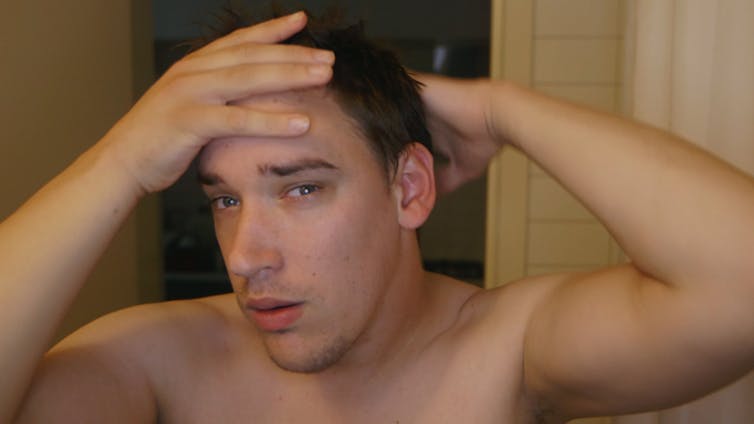Source: The Conversation (Au and NZ) – By Amie O’Shea, Lecturer, Disability & Inclusion, Deakin University
Review: Thomas Banks’ Quest for Love, directed by Pip Kelly
In Thomas Banks’ Quest for Love, Banks — a writer and comedian with cerebral palsy — addresses the additional taboos experienced by people with disability with diverse sexual identities.
The son of sheep farmers in regional Victoria, Banks came out as gay to his parents aged 16 and made this film because he wanted “to make people understand what it’s like to have a disability, but also be gay too”.
Banks is not alone. In Australia’s largest national survey on the health and well-being of LGBTIQ people, more than a third of respondents identified as having a disability or a long-term health condition.
Many of Banks’ experiences shown in the film are echoed in my recent research with LGBTIQA+ people with disability in Victoria. They include having movements and mobility mistaken for drunkenness and managing disability disclosure in an online dating environment. Yet he remains determined.Disability and sex
Sexuality is intrinsic to being human. Taboos around sexual identity and sexual expression form one of the barriers faced by people with disability. As disability advocate and writer Anne Finger has put it:
Sexuality is often the source of our deepest oppression; it is also often the source of our deepest pain. It’s easier for us to talk about — and formulate strategies for changing — discrimination in employment, education, and housing than to talk about our exclusion from sexuality and reproduction.
The current state of sex education and information provision for people with disability in Australia is deficient.
When available at all, it typically focuses on the “nuts and bolts” of sexuality without creating space for the nuance and exploration of the human experience.
The NDIS has led to a number of changes and improvements in the lives of people with disability in Australia, but the exclusion of sexuality continues.
In his own voice
Banks and I are both part of the Geelong LGBTIQ community. His part raunchy, part cheeky “oooh” is a kind of audible signature that alerts the room to his presence.
Although — or perhaps because — Banks has a speech impairment as a result of cerebral palsy, he is a master communicator. He capitalises on his diverse communication as an artistic strength. In the film, when he dials a wrong number, Banks patiently uses a variety of techniques to help the person on the call understand what he is saying. Eventually, he politely announces he will be hanging up.

So it’s rather jarring to hear voice-over actor Lachlan Tetloe-Stuart, who doesn’t have a speech impairment, read Banks’ first-person narration.
When Banks speaks on camera, his speech is subtitled because it can be difficult to understand. At other times, the use of the narrator is confusing. The audience misses the authenticity in Banks’ communication, and the opportunity to connect more directly with his experience. His story becomes mediated through another person.
The audience is presumed incapable of making the effort to read captions or invest effort in the act of listening.
Read more: In our own voices: 5 Australian books about living with disability
Unafraid to be seen
In earlier research, I spoke with a lesbian with intellectual disability who described a 2009 kiss between two female characters as “one of my favourite parts” of the TV soap Home and Away.
But a 2016 report from Screen Australia confirms the notable under-representation of LGBTQI characters (5%) and characters with an identifiable disability (4%). We clearly need to do better.
On the topic of inclusion and representation, Banks is not afraid to provoke. At one point he is seen interviewing guests at the Logie Awards red carpet, asking them why people with disability are not featured in mainstream Australian media — and certainly not allowed to be sexual.
When one celebrity humorously responds to his question by assuming he is straight, the point is neatly made that a non-normative sexual expression is inconceivable to many.
Twice in the film Banks is shown in a passionate kiss with another man. He makes visible that which is rarely seen: people with disability experiencing sexual pleasure.
Read more: Creating and being seen: new projects focus on the rights of artists with disabilities
In a magnificent demonstration of how strongly language can influence perceptions, Banks introduces us to his “personal assistant”. In choosing not to use the language of “carer” or “support worker”, Banks has positioned their relationship as one we associate with success, and away from ideas of “help”.
Thomas Banks’ Quest for Love speaks to the experiences of so many in the disability and LGBTIQ communities in the search for pride and self-acceptance in a world which seeks to diminish us.
He ends the film telling us:
I am me and I don’t give a shit about what people think about me. […] I know I will never become like you, but this is who I am.
Thomas Banks’ Quest for Love is out now on Stan.
– ref. Film review: Thomas Banks’ Quest for Love tackles life as a gay man with disability – https://theconversation.com/film-review-thomas-banks-quest-for-love-tackles-life-as-a-gay-man-with-disability-150060





